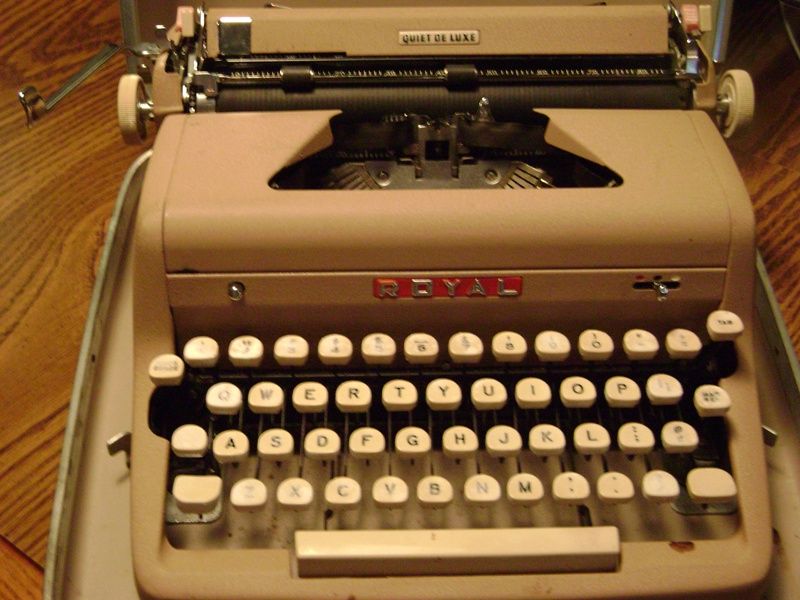- JanetLand
- Platen Punisher
 Offline
Offline - Registered: 16-12-2013
- Posts: 99
Key cleaning
Just picked up a Royal Quiet DeLuxe because I like the color:
It's in good shape but the keys have some white mold/fungus. Best way to clean that off?
Last edited by Uwe (14-7-2014 10:29:53)
- Uwe
- Moderator
 Offline
Offline 
- From: Toronto, Canada
- Registered: 12-3-2013
- Posts: 4,410
Re: Key cleaning
Very nice machine - good catch! I use Lysol wipes to give machines a general cleaning as they disinfect and clean everything (and I've bought plenty of machines that were covered in serious mould). If the key is discoloured, that's another issue. Valiant - another member here - has bleached such keys with success, but it involves removing them and letting them soak.
(hope you don't mind, but I inserted the image in the post to make it easier for others to view - it's very easy to do if you want - instructions for posting photos)
Last edited by Uwe (14-7-2014 10:32:44)
The pronoun I has always been capitalized in the English language for more than 700 years.
- JanetLand
- Platen Punisher
 Offline
Offline - Registered: 16-12-2013
- Posts: 99
Re: Key cleaning
Oh, thank you -- I meant to do that with the image and just forgot. ![]()
No, I don't think the keys are discolored at all; they just have a bit of mold that looks uninvitingly toxic to me. Lysol sounds like a good place to start.
- •
- malole
- Inactive Account
 Offline
Offline 
- From: East Anglia, UK
- Registered: 02-6-2014
- Posts: 330
Re: Key cleaning
I had some tenacious keytop mould on my lettera 22 and I ended up just scrubbing with a green plastic kitchen scrubber and washing-up liquid. I tried dettox, but that didn't shift it at all! That white mould is horrible, but it will come off ![]()
- M. Höhne
- Key Master
 Offline
Offline - From: Maine
- Registered: 14-3-2013
- Posts: 647
Re: Key cleaning
Relax, Folks. That material is almost certainly not a living mold or fungus. The plastic that Royal used to use for its keys and lever tips and platen knobs, etc. often exudes something from out of the plastic itself, just some chemical that isn't so stable as they though when they made the thing. It might be toxic but not in the same way a mold is.
I haven't found a chemical that gets rid of it, so my tool of choice is a sharpened wood stick, maybe a popsicle stick carved to fit the curve of the keys or whatever. A toothpick for tiny crevices. Wood doesn't scratch the plastic. Maybe plastic scrubbers will work, too. Steel wool will scratch and leave a dull appearance and maybe remove printed labels.I do believe in sanitizing keys and use alchohol for that and think all those other things mentioned here will also do fine. It's just that to get the stuff off, I have to scrape. Then I wax the pieces for a good shine. Feels good, too.
Mold is a genuine problem on fabrics, leather, felt soundproofing, wood, and other organic materials, just not on these plastics nor metals. Maybe some kinds of paint, too, though I don't think I have seen that. Treat those molds with disinfectants, vinegar, Fabreeze, and so on.
HTH. Have Fun!
- Uwe
- Moderator
 Offline
Offline 
- From: Toronto, Canada
- Registered: 12-3-2013
- Posts: 4,410
Re: Key cleaning
Whenever the subject of mould growth comes up, so does the degenerating plastic explanation. No doubt that it may sometimes explain what’s happening with the keys, but I assure you that I've bought many typewriters over the years with actual mould growth on them - including the keys. Many machines end up being stored in damp basements and other mould-friendly locations for many years on end, and although plastic might not promote or sustain its growth, the residue on them, such as the sebum secreted by human skin, must. When you pull a portable machine out of a travel case that is covered in mould, you can bet that the same stuff will be on the typewriter too. It’s not difficult to confirm; if the offending growth comes off easily by gently wiping it with a disinfectant cleaner it was most likely mould.
The pronoun I has always been capitalized in the English language for more than 700 years.
- M. Höhne
- Key Master
 Offline
Offline - From: Maine
- Registered: 14-3-2013
- Posts: 647
Re: Key cleaning
Agreed, Uwe. Thanks for adding that detail. You're right that keys have more on them than just plastic. Note that that is why I also disinfect the keys and other parts. In fact, that's my first move and invariably the disinfectant does not remove much of the white material---it does not comes off easily with a wipe. It does come off pretty easily with scraping with a softish tool so I just plan on doing that rather than keep on searching for yet another chemical. (Any chemists out there who can suggest an easier treatment for this exudate, this degeneration?)
The main point of my post was to counter the careless assumption that the stuff is mold and that it should respond to anti-mold treatments. Words mean something---or they should, if they are to be useful---and to call one thing by the name of something radically different is to mislead readers about what approach to take.
Whenever the subject of mold on keytops comes up, the degenerating plastic explanation should also come up. Ever wonder why this is so much more prevalent on Royal typewriters? Different plastic formulation from other manufacturers?
Last edited by M. Höhne (15-7-2014 08:04:36)
- JanetLand
- Platen Punisher
 Offline
Offline - Registered: 16-12-2013
- Posts: 99
Re: Key cleaning
I admit I called it "mold/fungus" as more of a descriptive shorthand than an actual identification; I am no biologist.
- •
- Uwe
- Moderator
 Offline
Offline 
- From: Toronto, Canada
- Registered: 12-3-2013
- Posts: 4,410
Re: Key cleaning
M. Höhne wrote:
Whenever the subject of mold on keytops comes up, the degenerating plastic explanation should also come up.
You're absolutely right.
M. Höhne wrote:
Ever wonder why this is so much more prevalent on Royal typewriters? Different plastic formulation from other manufacturers?
I've actually encountered very few, less than a handful of typewriters with the degenerating plastic issue with respect to keys, and none of the 15 or so Royal models I have had the issue. Granted, many of those models predate the use of plastic keys, but it still leads me to wonder if the keys (and the plastic used for them) were sourced locally? The reason I mention this is that of the plastic key models I have from that manufacturer, most were made in Canada, and in some cases the Netherlands.
That's not to say I haven't encountered manufacturer-specific issues with other materials. For example, of the 10+ Consul machines I own, the majority of them used what I describe as sub-standard rubber, especially the ultra-compacts which inevitably required me custom fabricating new rubber parts for them.
The pronoun I has always been capitalized in the English language for more than 700 years.
- Uwe
- Moderator
 Offline
Offline 
- From: Toronto, Canada
- Registered: 12-3-2013
- Posts: 4,410
Re: Key cleaning
JanetLand wrote:
I admit I called it "mold/fungus" as more of a descriptive shorthand than an actual identification; I am no biologist.
I think most of us are in the same boat. ![]()
Let us know how your cleaning efforts worked out. Based on what you had to do to get your keys clean will determine whether it was the mould you first suspected or the plastic degeneration that Michael raised. Good luck!
The pronoun I has always been capitalized in the English language for more than 700 years.

 1
1 